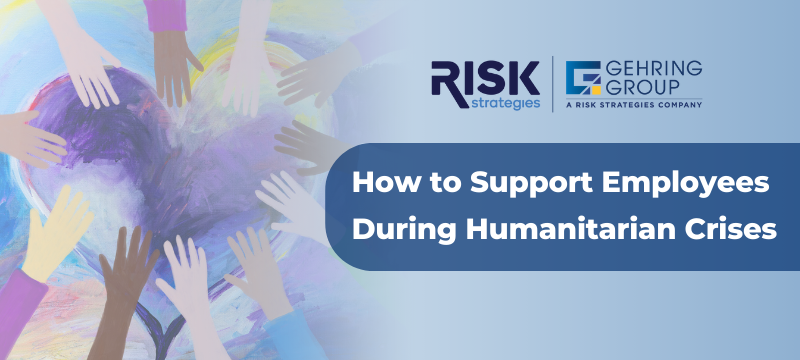
It can be difficult to process the world events you see in the news. Exposure to graphic images and stories of suffering can take a toll on our mental health, especially when we feel helpless to do anything about it. With our reliance on social media, those stories and images are more prevalent in our daily lives than any other time in history.
If you are a manager or employer, there are a few things you can do to support your employees when they are exposed to humanitarian crises.
- Acknowledge the impact. Let your employees know that it is okay to feel sad, angry, or overwhelmed by what they are seeing in the news. Reassure them that their feelings are valid and that they are not alone.
- Provide support resources. Share information about resources that can help employees cope with stress and trauma, such as your company’s employee assistance program (EAP), mental health hotlines, and crisis support websites. You may also want to offer to connect employees with other resources in their community, such as support groups or counseling services.
- Encourage employees to take care of themselves. Remind employees of the importance of getting enough sleep, eating healthy foods, and exercising regularly. These activities can help to reduce stress and improve mental well-being.
- Offer flexible work arrangements. If possible, offer employees the flexibility to work from home or take time off when they need it. This can help employees to manage their stress levels and cope with difficult emotions.
- Promote psychological safety. Psychological safety means creating an environment where employees feel comfortable expressing their thoughts without fear of negative consequences or judgment. Encourage employees to talk to each other about their feelings and support each other through difficult times. You may also want to hold team meetings or workshops to discuss how to cope with stress and trauma.
- Be mindful of your own triggers. If you have experienced trauma in your own life, be aware of the things that may trigger you in the news. It is ok to take breaks from reading or watching the news if you need to.
- Be mindful of your employees’ triggers. Some employees may be more sensitive to certain topics than others. Avoid sharing graphic images or stories of suffering with employees who you know are struggling to cope.
- Be respectful of employees’ boundaries. Some employees may not want to talk about the news at all. Respect their decision and do not pressure them to discuss something that they are not comfortable with.
- Be patient and understanding. It may take time for employees to process and cope with what they are seeing in the news. Offer your support in any way that you can.
Here are some helpful resources to help your employees navigate traumatic events:
| Disaster Distress Helpline 1-800-985-5990 www.samhsa.gov/find-help/disaster-distress-helpline | |
| Coping Tips for Traumatic Events | SAMHSA www.samhsa.gov/find-help/disaster-distress-helpline/coping-tips | |
| Coping with a Disaster or Traumatic Event | CDC emergency.cdc.gov/coping/ | |
| Talking to Children about War | The National Child Traumatic Stress Network nctsn.org/resources/talking-to-children-about-war | |
| How to Talk to Children about Difficult News | American Psychological Association www.apa.org/topics/journalism-facts/talking-children | |
| Coping with War-Related Stress: Information for Military Families and Communities | Mental Health America www.mhanational.org/coping-war-related-stress-information-military-families-and-communities | |
| National Center for PTSD | U.S. Department of Veterans Affairs www.ptsd.va.gov/ |